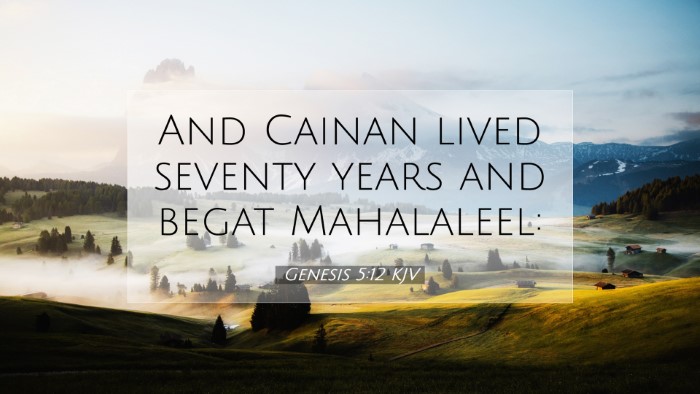Commentary on Genesis 5:12
Genesis 5:12 states, “And Cainan lived seventy years, and begat Mahalaleel.” This verse is part of the genealogical record tracing the lineage from Adam to Noah, highlighting the longevity of the patriarchs and their roles in biblical history.
Introduction
This genealogical narrative serves an essential purpose in the overall biblical account, offering insight into the early generations of humanity, their relationship to God, and the unfolding plan of redemption. The mention of Cainan, the son of Enos, and his age at the time of Mahalaleel’s birth, provides a detailed historical framework.
Insights from Public Domain Commentaries
Matthew Henry's Commentary
Matthew Henry emphasizes the significance of genealogy in Scripture, stating that it is not merely a catalog of names but a testament to the faithfulness of God in preserving a remnant of righteousness. In his commentary, he notes:
- The Role of Cainan: Cainan symbolizes a continuation of godly lineage amidst a world that would soon descend into corruption. His age of seventy years at the birth of Mahalaleel illustrates the normality of procreation in that ancient context.
- Longevity: The ages assigned to these early figures reflect a reality where humans lived significantly longer, suggesting God's initial design for mankind and the gradual decline of human lifespan due to sin.
- Faith and Heritage: Henry asserts that this verse invites reflection on faithfulness within families, encouraging today’s believers to consider the legacy they are imparting to future generations.
Albert Barnes' Notes on the Bible
Albert Barnes focuses on the historical and theological implications of Cainan’s lineage. His commentary highlights several critical points:
- Historical Context: Barnes places emphasis on the context of Cainan's life within the broader narrative of Genesis, arguing that the mention of this genealogy is crucial for understanding God’s plan and the covenantal promises made to humanity.
- Spiritual Significance: He suggests that the lives of these patriarchs serve as models of righteousness and endurance. The very act of naming Mahalaleel signifies worship and the acknowledgment of God’s sovereign hand in human affairs.
- Lessons for Today: Barnes encourages modern readers to view these genealogies not as tedious lists but rather as rich resources for understanding divine providence and the unfolding plan of salvation through various lineages leading to Christ.
Adam Clarke's Commentary
Adam Clarke provides a detailed analysis of the texts, focusing on etymology and the implications of names. In his insights, he brings forth several thoughts:
- Name Meaning: The name ‘Mahalaleel’ means “praise of God,” which indicates the character of the lineage that Cainan continues. Clarke points out that giving such names was a tradition that carried theological significance.
- Reflection on Spiritual Heritage: Clarke highlights the importance of names in biblical texts as they often denote spiritual realities or prophetic significance. The act of lineage tracing is a recognition of God's work through families.
- Theology of Generations: He adds that each name in these genealogies serves both as a historical marker and a reminder of the faithfulness of God across generations, compelling believers to remember their own spiritual ancestry and the faith they are called to uphold.
Thematic Implications
This verse carries several thematic implications that resonate across biblical theology:
- The Sovereignty of God: The genealogy from Adam to Noah evidences God's sovereignty in maintaining a remnant of believers. Cainan's life and lineage are a part of God's grand narrative of redemption.
- The Importance of Legacy: Continual mention and tracing of genealogies emphasize the importance of spiritual inheritance. Pastors and theologians are invited to reflect on the legacies they build in their communities and families.
- Lessons from Longevity: The long lifespans of these early figures compel modern readers to think deeply about the quality of life lived in relation to God, how to spend their days on earth wisely, and the impact they have on succeeding generations.
- The Hope embedded in Lineage: Cainan's begetting of Mahalaleel can be viewed as a hopeful admonition for believers today to strive earnestly in their faith, providing hope and direction for future generations.
Conclusion
Genesis 5:12 serves as a critical verse within the framework of Scripture, not only providing a historical account but also encouraging believers across generations to pursue righteousness and steward their spiritual heritage responsibly. The names, ages, and familial connections laid out in this genealogy remind us of God's unyielding faithfulness and the importance of honoring this legacy in our own lives.


